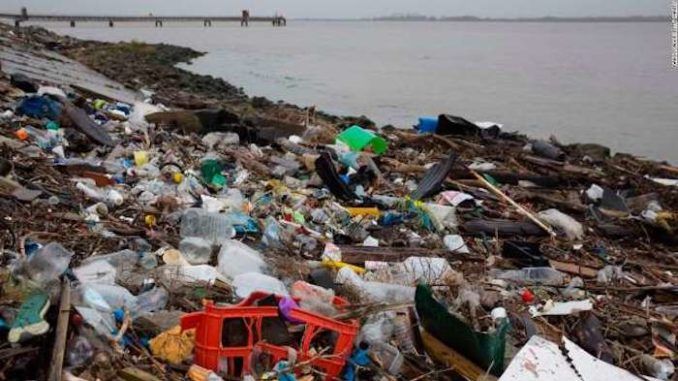
The average person now swallows five grams of plastic each week — the same amount of plastic as a credit card — according to new research by the WWF.
Researchers found that people are consuming up to 102,000 tiny pieces of plastic that add up to almost nine ounces each year – with nearly 90 per cent coming from water, both bottled and tap.
Many varieties of plastic carry chemicals and additives which have been shown to influence sexual function, fertility and increase the occurrence of genetic mutations and cancers.

BYPASS THE CENSORS
Sign up to get unfiltered news delivered straight to your inbox.
You can unsubscribe any time. By subscribing you agree to our Terms of Use
Other foods with highest plastic levels include shellfish, beer and salt.
Alec Taylor, Head of Marine Policy at WWF, said: “Plastic is polluting our planet in the deepest ocean trenches, but now we know that it’s also polluting our own bodies, through the food we eat and the water we drink.
“This report must serve as a wake-up call to the UK Government – we don’t want plastic in our oceans, and we don’t want it on our plates.”
Telegraph reports: Plastic is now so ubiquitous in nature that is has been found at the bottom of the Mariana trench, locked in Arctic sea ice, and littering the remote peaks of the French Pyrenees.
The new figures were compiled by researchers at the University of Newcastle in Australia who analysed more than 50 studies on the ingestion of plastic by people.
It found that globally the average person consumes up to 1,769 particle of plastic each week from water, 182 from shellfish, 11 pieces from salt and 10 from beer.
In Europe around 72 per cent of tap water now contains plastic with nearly two plastic fibres found per 500ml.
Dr Thava Palanisami, microplastics researcher at the University of Newcastle, said: “While the awareness of microplastics and their impact on the environment is increasing, this study has helped to provide an accurate calculation of ingestion rates for the first time.
“Developing a method for transforming counts of microplastic particles into masses will help determine the potential toxicological risks for humans, moving forward.”
Although the long-term effects of plastic ingestion on the human body are not yet known, some studies have shown that beyond a certain exposure level, inhalation of plastic fibres produce mild inflammation of the respiratory tract.
Some types of plastic carry chemicals and additives which have been shown to influence sexual function, fertility and increase the occurrence of genetic mutations and cancers.
Airborne microplastics may also carry pollutants from the surrounding environment. Britain has already taken 15 billion plastic bags out of circulation by imposing a 5p tax on bags and recently banned microbeads in cosmetics. From next April, straws will not be served unless specifically asked for by customers.


